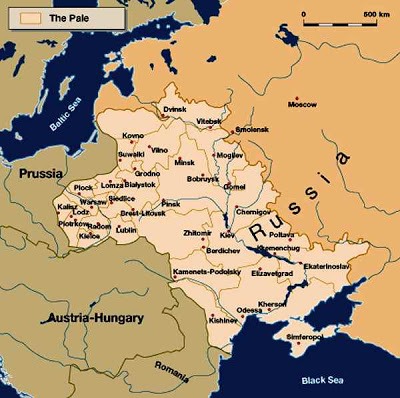THE PALE OF SETTLEMENT

Pogroms are almost universally regarded as a typically Russian phenomenon even though nearly all the "Russian" pogroms of the late nineteenth and early twentieth centuries occurred outside Russia, in Ukraine or Bessarabia (modern Moldova). (1) These, together with Byelorussia (apparently not so badly affected in the nineteenth century), made up the 'Pale of Settlement', previously, as we've seen in earlier articles, the areas of Poland that were incorporated into the Russian Empire in the eighteenth century. Jews had been excluded from Russia proper ('Great Russia') since the sixteenth century, though by the late nineteenth century exceptions were made for certain legally defined categories of the wealthier or more educated Jews. The 'Jewish problem', however, endlessly discussed by Russian government officials throughout the nineteenth century, had turned on the relations between Jews and peasants in the Pale. On the one hand Jews were blamed for exploiting the peasants and contributing to their misery (as argued in the Derzhavin memorandum, discussed in the last article in this series). On the other hand, Jews - as traders, craftsmen, estate managers, not just as distillers and tavern-keepers - were regarded as providing services that were essential to the wellbeing of the peasantry.
(1) Up to the twentieth century Ukraine was often referred to as 'Little Russia.'
The Russian Empire had inherited from Poland an extraordinary system in which the three main rural classes consisted of three different and fairly well defined religious/racial groups - Polish Catholic landlords, Ukrainian; Byelorussian, Bessarabian Orthodox peasants; Jewish middlemen. For all the vagaries of the constantly changing restrictions put on their activities, the Jews were, relative to the peasant serfs, an element of freedom, able to move more freely and freer to choose their own economic activity. Thus Solzhenitsyn can say, talking about the very early days of their incorporation into the Empire:
'It should be pointed out that the Jews were thus given equal rights not only in contrast to Poland, but also earlier than in France or the German states. (Under Frederick the Great the Jews suffered great limitations.) Indeed Jews in Russia had from the beginning the freedom that Russian peasants were only granted 80 years later. Paradoxically, the Jews gained greater freedom than even the Russian merchants and tradesmen. The latter had to live exclusively in the cities, while in contrast the Jewish population could "live in colonisations in the country and distill liquor." "Although the Jews dwelt in clusters not only in the city but also in the villages, they were counted as part of the city contingent — inclusive of merchant and townsmen classes."' (2)
(2) Pp 43-4 of the French edition. Translation in the English version available on Kindle. Passages in inverted commas are quotations. Solzhenitsyn gives his sources but I haven't bothered with them.
But for very large numbers of Jews, the peasantry was the main source of their possibility of making a living. They had to extract from a poor and downtrodden peasantry as much money as they possibly could. Under these circumstances one could be surprised that - leaving aside the seventeenth century Khelmnitsky rising which resulted in Ukraine East of the Dnieper being incorporated into the Russian Empire - pogroms did not occur earlier. When they did occur - the first of the series was in 1881 (3) - they caused great alarm as a first manifestation of mass political action. In all the previous discussions the peasantry in the Pale of Settlement had been regarded as helpless and inert victims. The pogroms could be (and were, both in government circles and among the radicals) regarded as a first spontaneous initiative of the newly emancipated peasantry.
(3) There were earlier pogroms in Odessa, in 1821, 1856 and 1871. Odessa was however something of a place apart as a territory taken from the Tatars with an essentially new population made up of many different nationalities. The 1821 and 1856 pogroms were products of tensions between Jews and Greeks. The 1871 pogrom started with a Jewish/Greek confrontation but, unlike the previous ones, the Greeks were joined by Russians. 6 people were killed, 21 wounded, 863 houses and 532 businesses damaged or destroyed. This, and the sympathy shown to the pogromists by government and intelligentsia, came as a profound shock to a Jewish community that thought itself more than usually well integrated. See Steve J. Zipperstein; 'Jewish enlightenment in Odessa: cultural characteristics, 1794-1871', Jewish Social Studies, Vol 44, No 1, Winter 1982, pp.19-36. Solzhenitsyn, it should be said, presents the 1871 pogrom as just another Greek/Jew confrontation and claims that there were no victims (pp.205-6 of the French edition).